#also this is ambiguous as to whether its canon-setting or modern its just Them
Text
fuckign obsessed with sabigiyu...
sabito's tough and snarky and brash when hes around people but then see him with giyuu and hes the biggest fucking puppy... constantly touching and being affectionate whenever he can, harshly stopping/snapping at anyone who tries to badmouth giyuu or even looks at him wrong, always glancing back when hes talking looking for giyuu's attention and recognition- he so freely displays his love and its just so sickeningly sweet to anyone around as witness
giyuu's a youngest child too, you know he'd eat that shit up. he fucking loves how much sabito spoils him- the occasional time sabito tries to be stern or ignores him all he has to do is bat his eyes and raise the corners of his mouth and sabito near immediately caves to whatever he wants. anything to see giyuu's full smile, and giyuu never hesitates with him
they know exactly what the other wants at a given moment, know when to be soft and sweet or when to be rough and wild- quietly sitting together close enough for their thighs to touch and enjoying the warmth of eachother's presence to playfully pushing buttons until the other snaps and gives their full attention to grappling the other to the ground. they'd both stop at the drop of a dime for the other for whatever reason needed, lovingly teasing and calling the other an idiot the whole way out
#loserboy giyuu posting#fratboy sabito posting#sabigiyu#sabito x giyuu#i found Anything You Want(JAWNY ft. dojacat) and i just asfdghgjhykdsfghjkyj sABITO#he fucking loves giyuu sm. theyre both utterly obsessed with eachother but sabito's more outgoing abt it so its#way more obvious to outsiders. anyone who actually knows how giyuu is see how down bad he is- hes a different person when sabito's#way more obvious to outsiders. anyone who actually knows how giyuu is see how down bad he is- hes a completely different person when#sabito's around vs when hes not and everyone thinks they're ridiculous#sabito got in a fight one time bc he called someone pathetic for being scared to openly love their partner#giyuu had to drag him out like a cat carrying an angry kitten. he was staring them down with death in his eyes then as soon as line of#sight broke he looked to giyuu with a proud little smile and giyuu dropped him on his ass for getting into a fight for such a stupid reason#sabito tried to defend his superior opinion but stopped when giyuu kissed the top of his head and started walking off. scrambled to get up#and follow- whatever he was gonna say forgotten and no longer important#ough...#sorry im unwell about them#i like thinking of what they'd be like if they hadnt lost eachother and turned cold in eachother's absence like they did in canon#sabito asshole & giyuu spoiled brat supremacy#also this is ambiguous as to whether its canon-setting or modern its just Them#'youve got the funk- gets me stupid gets me drunk- ill do anything that you want- anything that you want want want'#its just oUGH
57 notes
·
View notes
Text
fan language: the victorian imaginary and cnovel fandom
there’s this pinterest image i’ve seen circulating a lot in the past year i’ve been on fandom social media. it’s a drawn infographic of a, i guess, asian-looking woman holding a fan in different places relative to her face to show what the graphic helpfully calls “the language of the fan.”
people like sharing it. they like thinking about what nefarious ancient chinese hanky code shenanigans their favorite fan-toting character might get up to—accidentally or on purpose. and what’s the problem with that?
the problem is that fan language isn’t chinese. it’s victorian. and even then, it’s not really quite victorian at all.
--------------------
fans served a primarily utilitarian purpose throughout chinese history. of course, most of the surviving fans we see—and the types of fans we tend to care about—are closer to art pieces. but realistically speaking, the majority of fans were made of cheaper material for more mundane purposes. in china, just like all around the world, people fanned themselves. it got hot!
so here’s a big tipoff. it would be very difficult to use a fan if you had an elaborate language centered around fanning yourself.
you might argue that fine, everyday working people didn’t have a fan language. but wealthy people might have had one. the problem we encounter here is that fans weren’t really gendered. (caveat here that certain types of fans were more popular with women. however, those tended to be the round silk fans, ones that bear no resemblance to the folding fans in the graphic). no disrespect to the gnc old man fuckers in the crowd, but this language isn’t quite masc enough for a tool that someone’s dad might regularly use.
folding fans, we know, reached europe in the 17th century and gained immense popularity in the 18th. it was there that fans began to take on a gendered quality. ariel beaujot describes in their 2012 victorian fashion accessories how middle class women, in the midst of a top shortage, found themselves clutching fans in hopes of securing a husband.
she quotes an article from the illustrated london news, suggesting “women ‘not only’ used fans to ‘move the air and cool themselves but also to express their sentiments.’” general wisdom was that the movement of the fan was sufficiently expressive that it augmented a woman’s displays of emotion. and of course, the more english audiences became aware that it might do so, the more they might use their fans purposefully in that way.
notice, however, that this is no more codified than body language in general is. it turns out that “the language of the fan” was actually created by fan manufacturers at the turn of the 20th century—hundreds of years after their arrival in europe—to sell more fans. i’m not even kidding right now. the story goes that it was louis duvelleroy of the maison duvelleroy who decided to include pamphlets on the language with each fan sold.
interestingly enough, beaujot suggests that it didn’t really matter what each particular fan sign meant. gentlemen could tell when they were being flirted with. as it happens, meaningful eye contact and a light flutter near the face may be a lingua franca.
so it seems then, the language of the fan is merely part of this victorian imaginary we collectively have today, which in turn itself was itself captivated by china.
--------------------
victorian references come up perhaps unexpectedly often in cnovel fandom, most often with regards to modesty.
it’s a bit of an awkward reference considering that chinese traditional fashion—and the ambiguous time periods in which these novels are set—far predate victorian england. it is even more awkward considering that victoria and her covered ankles did um. imperialize china.
but nonetheless, it is common. and to make a point about how ubiquitous it is, here is a link to the twitter search for “sqq victorian.” sqq is the fandom abbreviation for shen qingqiu, the main character of the scum villain’s self-saving system, by the way.
this is an awful lot of results for a search involving a chinese man who spends the entire novel in either real modern-day china or fantasy ancient china. that’s all i’m going to say on the matter, without referencing any specific tweet.
i think people are aware of the anachronism. and i think they don’t mind. even the most cursory research reveals that fan language is european and a revisionist fantasy. wikipedia can tell us this—i checked!
but it doesn’t matter to me whether people are trying to make an internally consistent canon compliant claim, or whether they’re just free associating between fan facts they know. it is, instead, more interesting to me that people consistently refer to this particular bit of history. and that’s what i want to talk about today—the relationship of fandom today to this two hundred odd year span of time in england (roughly stuart to victorian times) and england in that time period to its contemporaneous china.
things will slip a little here. victorian has expanded in timeframe, if only because random guys posting online do not care overly much for respect for the intricacies of british history. china has expanded in geographic location, if only because the english of the time themselves conflated china with all of asia.
in addition, note that i am critiquing a certain perspective on the topic. this is why i write about fan as white here—not because all fans are white—but because the tendencies i’m examining have a clear historical antecedent in whiteness that shapes how white fans encounter these novels.
i’m sure some fans of color participate in these practices. however i don’t really care about that. they are not its main perpetrators nor its main beneficiaries. so personally i am minding my own business on that front.
it’s instead important to me to illuminate the linkage between white as subject and chinese as object in history and in the present that i do argue that fannish products today are built upon.
--------------------
it’s not radical, or even new at all, for white audiences to consume—or create their own versions of—chinese art en masse. in many ways the white creators who appear to owe their whole style and aesthetic to their asian peers in turn are just the new chinoiserie.
this is not to say that white people can’t create asian-inspired art. but rather, i am asking you to sit with the discomfort that you may not like the artistic company you keep in the broader view of history, and to consider together what is to be done about that.
now, when i say the new chinoiserie, i first want to establish what the original one is. chinoiserie was a european artistic movement that appeared coincident with the rise in popularity of folding fans that i described above. this is not by coincidence; the european demand for asian imports and the eventual production of lookalikes is the movement itself. so: when we talk about fans, when we talk about china (porcelain), when we talk about tea in england—we are talking about the legacy of chinoiserie.
there are a couple things i want to note here. while english people as a whole had a very tenuous knowledge of what china might be, their appetites for chinoiserie were roughly coincident with national relations with china. as the relationship between england and china moved from trade to out-and-out wars, chinoiserie declined in popularity until china had been safely subjugated once more by the end of the 19th century.
the second thing i want to note on the subject that contrary to what one might think at first, the appeal of chinoiserie was not that it was foreign. eugenia zuroski’s 2013 taste for china examines 18th century english literature and its descriptions of the according material culture with the lens that chinese imports might be formative to english identity, rather than antithetical to it.
beyond that bare thesis, i think it’s also worthwhile to extend her insight that material objects become animated by the literary viewpoints on them. this is true, both in a limited general sense as well as in the sense that english thinkers of the time self-consciously articulated this viewpoint. consider the quote from the illustrated london news above—your fan, that object, says something about you. and not only that, but the objects you surround yourself with ought to.
it’s a bit circular, the idea that written material says that you should allow written material to shape your understanding of physical objects. but it’s both 1) what happened, and 2) integral, i think, to integrating a fannish perspective into the topic.
--------------------
japanning is the name for the popular imitative lacquering that english craftspeople developed in domestic response to the demand for lacquerware imports. in the eighteenth century, japanning became an artform especially suited for young women. manuals were published on the subject, urging young women to learn how to paint furniture and other surfaces, encouraging them to rework the designs provided in the text.
it was considered a beneficial activity for them; zuroski describes how it was “associated with commerce and connoisseurship, practical skill and aesthetic judgment.” a skillful japanner, rather than simply obscuring what lay underneath the lacquer, displayed their superior judgment in how they chose to arrange these new canonical figures and effects in a tasteful way to bring out the best qualities of them.
zuroski quotes the first english-language manual on the subject, written in 1688, which explains how japanning allows one to:
alter and correct, take out a piece from one, add a fragment to the next, and make an entire garment compleat in all its parts, though tis wrought out of never so many disagreeing patterns.
this language evokes a very different, very modern practice. it is this english reworking of an asian artform that i think the parallels are most obvious.
white people, through their artistic investment in chinese material objects and aesthetics, integrated them into their own subjectivity. these practices came to say something about the people who participated in them, in a way that had little to do with the country itself. their relationship changed from being a “consumer” of chinese objects to becoming the proprietor of these new aesthetic signifiers.
--------------------
i want to talk about this through a few pairs of tensions on the subject that i think characterize common attitudes then and now.
first, consider the relationship between the self and the other: the chinese object as something that is very familiar to you, speaking to something about your own self vs. the chinese object as something that is fundamentally different from you and unknowable to you.
consider: [insert character name] is just like me. he would no doubt like the same things i like, consume the same cultural products. we are the same in some meaningful way vs. the fast standard fic disclaimer that “i tried my best when writing this fic, but i’m a english-speaking westerner, and i’m just writing this for fun so...... [excuses and alterations the person has chosen to make in this light],” going hand-in-hand with a preoccupation with authenticity or even overreliance on the unpaid labor of chinese friends and acquaintances.
consider: hugh honour when he quotes a man from the 1640s claiming “chinoiserie of this even more hybrid kind had become so far removed from genuine Chinese tradition that it was exported from India to China as a novelty to the Chinese themselves”
these tensions coexist, and look how they have been resolved.
second, consider what we vest in objects themselves: beaujot explains how the fan became a sexualized, coquettish object in the hands of a british woman, but was used to great effect in gilbert and sullivan’s 1885 mikado to demonstrate the docility of asian women.
consider: these characters became expressions of your sexual desires and fetishes, even as their 5’10 actors themselves are emasculated.
what is liberating for one necessitates the subjugation and fetishization of the other.
third, consider reactions to the practice: enjoyment of chinese objects as a sign of your cosmopolitan palate vs “so what’s the hype about those ancient chinese gays” pop culture explainers that addressed the unconvinced mainstream.
consider: zuroski describes how both english consumers purchased china in droves, and contemporary publications reported on them. how:
It was in the pages of these papers that the growing popularity of Chinese things in the early eighteenth century acquired the reputation of a “craze”; they portrayed china fanatics as flawed, fragile, and unreliable characters, and frequently cast chinoiserie itself in the same light.
referenda on fannish behavior serve as referenda on the objects of their devotion, and vice versa. as the difference between identity and fetish collapses, they come to be treated as one and the same by not just participants but their observers.
at what point does mxtx fic cease to be chinese?
--------------------
finally, it seems readily apparent that attitudes towards chinese objects may in fact have something to do with attitudes about china as a country. i do not want to suggest that these literary concerns are primarily motivated and begot by forces entirely divorced from the real mechanics of power.
here, i want to bring in edward said, and his 1993 culture and imperialism. there, he explains how power and legitimacy go hand in hand. one is direct, and one is purely cultural. he originally wrote this in response to the outsize impact that british novelists have had in the maintenance of empire and throughout decolonization. literature, he argues, gives rise to powerful narratives that constrain our ability to think outside of them.
there’s a little bit of an inversion at play here. these are chinese novels, actually. but they’re being transformed by white narratives and artists. and just as i think the form of the novel is important to said’s critique, i think there’s something to be said about the form that fic takes and how it legitimates itself.
bound up in fandom is the idea that you have a right to create and transform as you please. it is a nice idea, but it is one that is directed towards a certain kind of asymmetry. that is, one where the author has all the power. this is the narrative we hear a lot in the history of fandom—litigious authors and plucky fans, fanspaces always under attack from corporate sanitization.
meanwhile, said builds upon raymond schwab’s narrative of cultural exchange between european writers and cultural products outside the imperial core. said explains that fundamental to these two great borrowings (from greek classics and, in the so-called “oriental renaissance” of the late 18th, early 19th centuries from “india, china, japan, persia, and islam”) is asymmetry.
he had argued prior, in orientalism, that any “cultural exchange” between “partners conscious of inequality” always results in the suffering of the people. and here, he describes how “texts by dead people were read, appreciated, and appropriated” without the presence of any actual living people in that tradition.
i will not understate that there is a certain economic dynamic complicating this particular fannish asymmetry. mxtx has profited materially from the success of her works, most fans will not. also secondly, mxtx is um. not dead. LMAO.
but first, the international dynamic of extraction that said described is still present. i do not want to get overly into white attitudes towards china in this post, because i am already thoroughly derailed, but i do believe that they structure how white cnovel fandom encounters this texts.
at any rate, any profit she receives is overwhelmingly due to her domestic popularity, not her international popularity. (i say this because many of her international fans have never given her a cent. in fact, most of them have no real way to.) and moreover, as we talk about the structure of english-language fandom, what does it mean to create chinese cultural products without chinese people?
as white people take ownership over their versions of stories, do we lose something? what narratives about engagement with cnovels might exist outside of the form of classic fandom?
i think a lot of people get the relationship between ideas (the superstructure) and production (the base) confused. oftentimes they will lob in response to criticism, that look! this fic, this fandom, these people are so niche, and so underrepresented in mainstream culture, that their effects are marginal. i am not arguing that anyone’s cql fic causes imperialism. (unless you’re really annoying. then it’s anyone’s game)
i’m instead arguing something a little bit different. i think, given similar inputs, you tend to get similar outputs. i think we live in the world that imperialism built, and we have clear historical predecessors in terms of white appetites for creating, consuming, and transforming chinese objects.
we have already seen, in the case of the fan language meme that began this post, that sometimes we even prefer this white chinoiserie. after all, isn’t it beautiful, too?
i want to bring discomfort to this topic. i want to reject the paradigm of white subject and chinese object; in fact, here in this essay, i have tried to reverse it.
if you are taken aback by the comparisons i make here, how can you make meaningful changes to your fannish practice to address it?
--------------------
some concluding thoughts on the matter, because i don’t like being misunderstood!
i am not claiming white fans cannot create fanworks of cnovels or be inspired by asian art or artists. this essay is meant to elaborate on the historical connection between victorian england and cnovel characters and fandom that others have already popularized.
i don’t think people who make victorian jokes are inherently bad or racist. i am encouraging people to think about why we might make them and/or share them
the connections here are meant to be more provocative than strictly literal. (e.g. i don’t literally think writing fanfic is a 1-1 descendant of japanning). these connections are instead meant to 1) make visible the baggage that fans of color often approach fandom with and 2) recontextualize and defamiliarize fannish practice for the purposes of honest critique
please don’t turn this post into being about other different kinds of discourse, or into something that only one “kind” of fan does. please take my words at face value and consider them in good faith. i would really appreciate that.
please feel free to ask me to clarify any statements or supply more in-depth sources :)
1K notes
·
View notes
Text
“Her Sweet Kiss” - A Short Analysis
Preface: In my job, a key part of my role is to select and analyse various different forms of poetry (yes, lyrics are a type of poem) so, I am keenly aware of the difference between what could be considered quality poetic verse and the doggerel we frequently hear passed off as lyrics in modern songs. I was expecting the latter from the soundtrack to Netflix’s The Witcher, I was wrong.
Although, at first listen “Her Sweet Kiss” appeared to be a simple love ballad, the uncommon depth and intricacy of the symbolism stunned and forced me to take another listen. Additionally, its arrangement within key scenes of the episode, as well as the inclusion of both alternative lyrics and instrumental versions was ingenious. I don’t have time to do a full analysis, instead, I have pulled together a basic overview of the key elements which stood out to me from this marvellously complex song. I hope this may assist you with your own interpretations.
Before we start analysing the lyrics, let’s look at the contextual placement of this song within the episode 'Rare Species'. It is featured at three key moments; the opening scene showing Jaskier composing the song, the sex scene between Geralt and Yennifer and then finally played over the credits.
In the opening scene, Jaskier is shown singing and composing while waiting for Geralt to return from a hunt. The lyrics are slightly different here and include the adjectives ‘gorgeous’ and ‘lovely’ in reference to the ‘Garroter’ character. He asks the men nearby whether the metaphorical use of ‘garroter’ is too ‘cerebral’, indicating that it is indeed symbolic of someone (Geralt). The lines “I’m weak, my love, and I am wanting… Gorgeous Garroter, jury and judge”, are sung by Jaskier and introduce the concept that the narrator is in love with someone but is also conflicted about their choice to follow them on 'The Path' (more on this later). It is also important to note that the notebook resting on his thigh contains an alternative version of the lyrics which do not feature the secondary 'her' character yet and instead focus instead on the narrator’s own weakness and inability to leave what he feels in an unfair relationship 'If I were a man of more merit, if I were a man of resolve I’d leave you behind, get my fair peace of mind'.
The second time the song is heard during the sex scene between Geralt and Yennifer. This time the song is purely instrumental. The moment where they first kiss, the chorus line 'She’ll destroy with her sweet kiss' is playing. As the audience had already heard some of the song, they would recognize it. But as they only heard the earlier version, which describes only the narrator’s willingness to suffer to be with the one he loves, the full significance of the song is not yet established with the audience. This lack of audible lyrics further symbolizes the narrator’s uncertain feelings towards their relationship at this point in the episode. But also unambiguously associates the song with both Geralt and Yennefer, establishing it as a proxy theme song for their romance and further supporting the argument that the characters from the song are indeed Geralt and Yennifer.
The final time this song is heard is over the end credits, this time the song is sung by Jaskier and plays in full. The previous ambiguity is sharply contrasted here when the revised set of lyrics are presented to the audience and the true theme of the is song revealed (Jaskier’s anguish). The final scene between Geralt, Yennifer and Jaskier is key to contextualizing these lyrics as it directly foreshadows many lines and themes explored in the song. For example, in Jaskier’s line 'that’s not fair' echoing the lyrics directly and the show’s constant depiction of Yennefer using storm imagery (both themes explored in more detail below).
The Characters
The song contains three distinct characters 'I/Narrator', 'You/Garrotter' and 'Her'.
'I/Narrator' – The narrator of the song, possibly Jaskier – It has been established in songs such as ‘Toss a Coin to Your Witcher’ that Jaskier frequently writes from his own perspective and as clearly illustrated in the lines 'When a humble Bard, graced a ride along with Geralt of Rivia along came this song' frequently portray Geralt as their protagonist (this is also canonical for the books, but, I’m limiting my interpretations to the show). Additionally, many key themes and concepts from the lyrics directly reference Jaskier’s own life and experiences (explored in more detail in later paragraphs). It is later shown that Jaskier has written so many highly successful songs about Geralt that the prostitute in the opening scene of ‘Betrayer Moon’ was able to identify his scars by their relevant songs and was surprised to find one that she did not recognize. It can plausibly be argued that ‘Her Sweet Kiss’ is both autobiographical and includes Geralt as a key character.
'You/Garotter' - The love interest of the narrator and also addressed as 'My Love' and 'Fool' - We can connect this 'Garotter' character with ‘Geralt’ through both the phonological similarity between the words and in scene featuring Marilka in the episode 'The End’s Beginning' when she points out 'Geralt'… like Garroter?' a canonically explicit linking of the names. ‘Garotter’ is a term for a killer, specifically, someone who does so through strangling, symbolic of Geralt’s employment. Jaskier himself points out that the ‘metaphor’ may be to ‘cerebral’, indicating to us the audience the need to interpret the line figuratively rather than literally.
'Her'- The rival for the narrators love interest - A woman described as a destructive and unjust force, using wild, nature-based metaphors such as ‘storms’ and ‘currents’ to describe her ‘love’. Repeatedly throughout the show Yennefer is also described using similar nature/storm imagery, such as Geralt’s description of her 'like a tornado wreaking havoc' (a line Jaskier is shown to have overheard as the camera pans to him).
The evidence then supports the supposition that the song may well be written from Jaskier’s perspective, exploring his feeling regarding Geralt’s and Yennifer’s relationship (for a discussion on the dubious nature of consent in this relationship see my other post). For convenience of analysis, from here on I will be assuming the narrator is Jaskier, the 'Her' character is Yennifer and the 'You/Garotter' character is Geralt'.
The Lyrics
The ‘’fairer sex’’ they often call it, but her love’s as unfair as a crook.
Jaskier opens the song by comparing the cliché of women being 'the fairer sex' with the simile 'love’s as unfair as a crook' (an old-fashioned term for a criminal or thief). As ‘fair’ has the dual meaning of both beauty and justice, his description of her as ‘unfair’ attacks both her beauty and her morality. The simile comparing her to a 'crook' (an old-fashioned term for a criminal or thief) suggests that Jaskier feels that she acts both unjustly and steals her love (a possible oblique reference Yennifer’s willingness to use magic to coerce sexual behaviour and disregard consent – as illustrated by the scene Jaskier witnessed in ‘Bottled Appetites’ where she compels a large group of apparently unwilling participants to engage in group sex). The song also echoes Jaskier’s dialogue 'That’s not fair' after Geralt unfairly lashes out at him after his argument with Yennefer, providing further evidence for the autobiographical nature of the song.
It steals all my reason, commits every treason of logic with naught but a look.
Yennifer’s ‘love’, he argues ‘steals’ (continuing the symbolism of her immorality) and commits ‘treason’ (the crime of betrayal) furthering the description of her as being both unlawful and ‘unfair’ in her relationship with Geralt. These lines also illustrate the despair Jaskier feels over not being able to convince Geralt of her corrupt nature. He feels that she can defeat or prevent his ‘logic’ and ‘reason’ easily, ‘with naught but a look’.
A storm raging on the horizon of longing, and heartache, and lust
The show repeatedly correlates Yennifer’s behaviour with the destructive forces of nature, and storms in particular. Scenes such as that at Aretusa where she bodily subsumes lightning then uses it to attack another student and when Geralt describes her as a ‘tornado wrecking havoc’ among others, highlight this correlation. Jaskier describing her as a 'storm' that is 'raging' highlights his perception of her as both destructive and aggressive. The storm in this line is be symbolic of Yennifer herself, showing that Jaskier recognizes her arrival as leading to ‘heartache’ and ‘lust’ rather than genuine love between her and Geralt.
She’s always bad news, it’s always lose-lose
The repetition of ‘always’ in these lines clearly illustrate how desperately Jaskier feels about the situation. He argues that involvement with her will inevitably lead to pain and loss for all of them, there is no way to win.
So, tell me, Love, tell me, Love. How is that just?
This line is a direct address to Geralt (his ‘Love’), begging him to explain, to see, to speak to him and understand. The rhetorical question 'How is that just?' again draws back to the concept of the ‘unfairness’ and injustice of her relationship with Geralt, Jaskier feels that she ‘steals’ love rather than earning or winning it (again a possible reference to lack of consent). The use of a rhetorical question also implies that he feels powerless and unable to expect any response to his pleas.
But the story is this. She’ll destroy with her sweet kiss. Her sweet kiss
Here Jaskier is using juxtaposition to show how her ‘sweet kiss’ (symbolic of her sexual relationship with Geralt) will ‘destroy’ him. He sets the tone by stating as fact that ‘The story is this', affirming his opinion that no other possible narrative exists beyond her storm-like destruction of their relationship and Geralt himself.
Her current is pulling you closer, a charge in the hot, humid night.
This line again uses the theme of the destructive power of nature, Yennefer is like a ‘current’ pulling Geralt towards her. The repeated portrayal of Yennefer as a destructive force of nature somewhat dehumanises her, correlating her actions with an uncaring inhuman force rather than that of a woman with genuine affections.
The red sky at dawn is giving a warning. You Fool better stay out of sight
This line references an ancient mariners rhyme 'Red sky at night, sailors' delight.Red sky at morning, sailors' warning.' meant to warn sailors of an impending storm when a red sky is seen at dawn. Jaskier is again using the ‘storm’ metaphor to warn Geralt about Yennifer. He addresses Geralt directly, calling him a ‘fool’ and advising him to hide from her destruction.
I’m weak, my love, and I am wanting. If this is the path I must trudge.
This line provides a key insight into the identities of the characters and their relationship to each other. In Witcher canon 'The Path' is the name given to the life of a Witcher as he journeys around the continent battling monsters. It’s somewhat comparable to the religious concept of a 'calling'. By describing his choice to accompany Geralt on his quests as 'trudging' indicates that he does not enjoy the journey aspect of their relationship, but also signals his acceptance of this as the price he must pay for a relationship with Geralt.
To further this point, in the show Jaskier does not always join Geralt in his actual monster battles, instead, it is implied that Geralt himself later recounts the stories. This is evidenced by the lines 'Geralt’s usually so stingy with the details' and later 'I’ll go get the rest of the story from the others'. This habit of receiving the tale after the events reveals that there is no need for Jaskier to continuously accompany Geralt on his journeys, multiple tales could just as easily be collected from Geralt or others (as seen in the tavern scene) at a later date. It can be supposed then that Jaskier, therefore, chooses to accompany Geralt for ‘love’, a reason which is also explored in the notebook version of the lyrics, 'If I were a man of more merit, if I were a man of resolve I’d leave you behind, get my fair peace of mind' It is implied here that he should leave but can’t because his love for Geralt is too powerful.
I’ll welcome my sentence, give to you my penance. Garroter, jury and judge
Jaskier’s conflicted feelings about his choice to accompany Geralt is explored further in the line above. He described the act of joining 'the path' as a form of punishment ('sentence' and 'penance') for being 'weak' and desirous ('wanting' Geralt). This ‘sentence’ is enforced by a 'jury and judge', the Garotter (Geralt).
The song’s repeated use of justice/legal symbolism is interesting. He places Geralt into the role of a 'Jury and Judge' passing out sentences from a position of power and control over Jaskier (and arguably Yennefer). Yennifer is described as a 'crook' who 'steals' and commits 'treason', but is not punished for these criminal acts. Instead, it is Jaskier himself who is punished, made to give 'penance'. He feels this is an injustice and 'unfair'. This sentiment neatly reflects the events of 'Rare Species', where after his disastrous romance with Yennefer, Geralt lashes out at Jaskier, accusing him of causing all of his misfortune.
It can be imagined then that Jaskier may have taken his half-composed love song and written new lyrics in direct reaction to that betrayal; his pain laid bare in verse.
#witcher netflix#the witcher#witcher meta#geralt x dandelion#geralt of rivia#geralt x jaskier#her sweet kiss#song analysis#meta#poetry analysis#jaskier#yennerfer#long reads#I should put this under a cut but I can't work out how
579 notes
·
View notes
Text
Hi Good Omens fans, ever since making this blog, and trawling through the archives for old art, I have been thinking again about trends from before the TV-show, and the way people draw Aziraphale and Crowley. I wanted to make this post addressing it but this is not “discourse” or to start a fight, in fact I would be perfectly content if all I did was make people think critically about what I am about to say and not even interact with this post at all, but I feel like I need to say it.
Talking about any racist undertones to the way people draw our two favorite boys usually makes people dig their heels in pretty fast. This is not a callout post for any artist in particular, this is not me trying to be overly critical of artists especially since they have more talent and skill than I do, and I’m going to address some common counterpoints that I frankly find unsatisfactory. Let’s just take a moment to set aside our defensiveness and think objectively about these trends. It took me a while to unlearn my dismissive attitude about these concerns so maybe I can help others get over that hurdle a little faster. Now let’s begin.
I’ve been kicking around the Good Omens fandom since maybe 2015 and for art based in book canon, whether it was made before the TV show came out, or because the artist is consciously drawing different, original designs, I’m going to estimate that a decent 75% of all fanart looks like this

Aziraphale is white and blonde and blue-eyed while Crowley is the typical “racially ambiguous” brown skin tone it’s become so popular to draw podcast characters as nowadays.
And the question is why? With the obvious answer being “it’s racist,” but let’s delve a little deeper than that.
A common thing I hear is that people get appearance headcanons fixed in their mind because the coverart of the book pictures the characters a certain way. My first point is this only shifts the question to why the illustrators drew them that way, when there aren’t many physical descriptions in the book. My second point is that while there definitely are cover arts that picture Aziraphale as cherubic, blonde, and white and Crowley as swarthy, dark-skinned, and racially ambiguous...
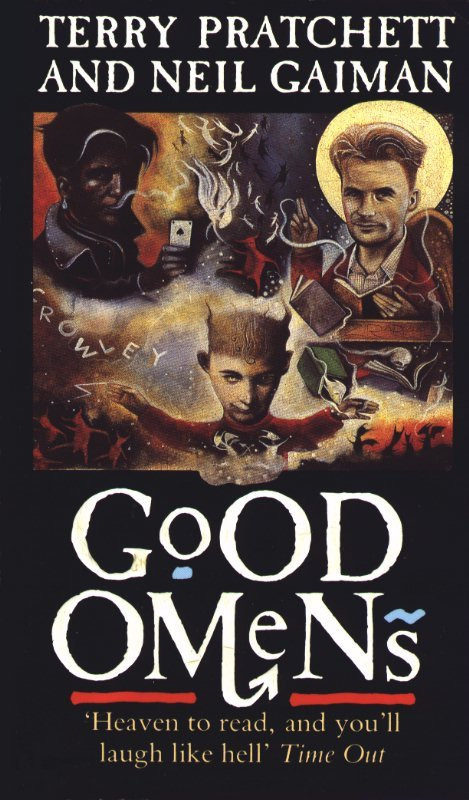
(side note: why is Crowley’s hand so tiny? what the hell is going on in this cover?)
It’s much more common for the covers to simplified, stylized, and without any particular unambiguous skin tones
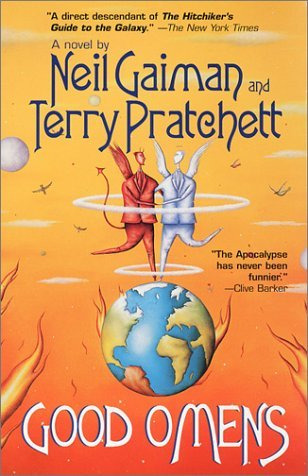
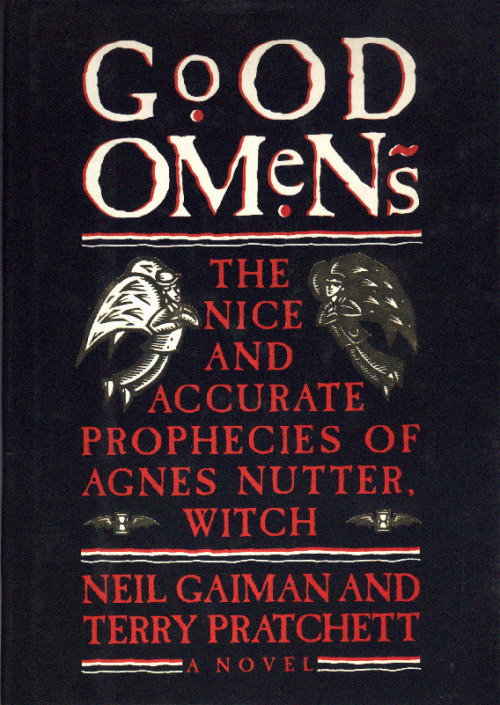
I don’t know about the UK but the most popular version in the United States is the dual black and white matching covers
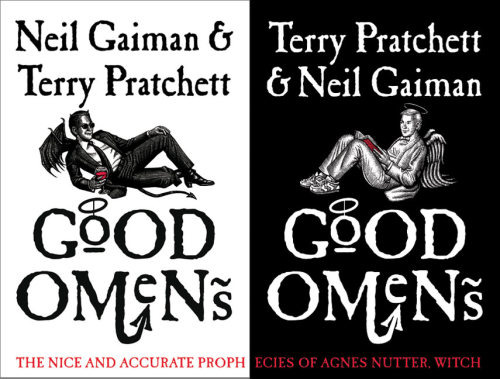
And while you could make an argument that the shading on Crowley’s face could suggest a darker skintone, it seems obvious to me that lacking any color these are not supposed to suggest any particular race for either of these two, and the contrasting colors are a stylistic choice to emphasize how they are on opposite sides. If anything, to me it suggests they are both white.
In short I simply do not buy the argument that people are drawing Aziraphale and Crowley this way because that’s how they were represented on the cover art of the book. If you draw them the way they are on the cover then whatever, I don’t care, but I don’t believe that’s what’s driving this trend.
The second thing people will say is that Good Omens is a work of satire, and it’s based in Christian mythology which has this trend of depicting angels as white, and it is embodying the trope of a “white, cherubic angel” paired with a dark-skinned demon for the explicit purpose of subverting the trope of “white angel is good, dark demon is bad” since Aziraphale is not an unambiguous hero and Crowley is not a villain. “It’s not actually like that because Crowley isn’t a bad demon, and Aziraphale isn’t actually a perfect angel” is the argument. This has a certain logic to it and allows some nuance to the topic, but to this I say:
Uncritically reproducing a trope, even in the context of a satire novel, is not enough to subvert it. Good Omens is not criticising the racist history of the church, and while the book does have some pointed jabs at white British culture (such as Madam Tracy conning gullible Brits with an unbelievably ignorant stereotype of a Native American) it is not being critical of the conception of angels as white and blonde or the literal demonization of non-white people. That’s just not what the book is about. So making the angel white and the demon dark-skinned, playing directly into harmful tropes and stereotypes, is not somehow subversive or counter-cultural when doing so doesn’t say anything about anything.


Please consider fully the ramifications of the conception of white and blonde people as innocent and cherubic and dark-skinned people as infernal and mischievous, especially in modern contexts...
Black people are more likely to be viewed as violent, angry, and dangerous. Priming with a dark-skinned face makes people more likely to mistake a tool for a gun. Black people are viewed as experiencing pain less intensely by medical professionals. Black men are viewed as physically larger and more imposing than they actually are. The subconscious racial bias favoring light skin is so ingrained it’s measurable by objective scientific studies, on top of the anecdotal evidence of things like news stories choosing flattering, “cherubic” pictures of white and blond criminals while using unflattering mugshots for non-white offenders.
This is why I say that if you’re going to invoke the “whites are angelic” trope, you better have a damn good subversion of it to justify it, because this idea causes real harm to real people in the real world. And Aziraphale being a bit of a bastard despite being an angel, I just don’t see that as sufficient. I am especially cautious of when it’s my fellow white fans that make this argument, not because I believe they do this out of any sort of malice or hatred of people with dark skin, but because I know first-hand it stems from a dismissiveness rooted in not wanting to think about it for too long because it makes us uncomfortable. Non-white people do not have the luxury of not thinking about it, because it’s part of their life.
Now the strongest textual evidence people use, in the absence of much real descriptor, is this:
"Many people, meeting Aziraphale for the first time, formed three impressions: that he was English, that he was intelligent, and that he was gayer than a tree full of monkeys on nitrous oxide. Two of these were wrong; Heaven is not in England, whatever certain poets may have thought, and angels are sexless unless they really want to make an effort"
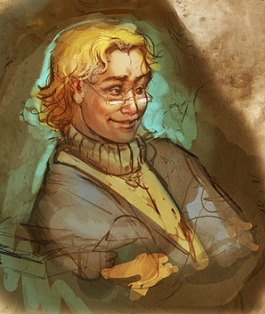
This piece of art has circulated in the fandom for so long I don’t know the original artist and it’s been used for everything from fancovers to perfume. This is where I found it and it’s one of the first things that come up when you google this quote about Aziraphale.
Doesn’t it just feel like this is the man that’s describing, some blonde effeminate gay man? Well guess what, there’s the “blonde as innocence” trope rearing its ugly head again, because the stereotype of gay men and effeminacy as being a white and blonde thing is--ding ding ding you guessed it--racism. And why would intelligent suggest a white and blonde person, except if the stereotype of a dark-skinned person is less intelligent?
Now the point of “people assume Aziraphale is British” is another sticking point people will often use, claiming that the stereotype of a British person is white and blonde. I guess this has some merit, since the British empire was one of the biggest forces behind white colonial expansion, and it seems disingenuous to assign “British” as “nonwhite” as soon as we’re being satirical, in the same way I found it distasteful that the TV show made God female when so many of the criticisms of the church are about its misogyny and lose their teeth as soon as God is no longer male.
However consider that 1.4 million Indian people live in the UK. I heard a man say aloud once that the concept of a black person having a British accent was a little funny, as though Doctor Who doesn’t exist and have black people on it. And I’m not overly familiar with the social landscape of the UK, but I understand they’re experiencing a xenophobia boom and non-white Brits aren’t considered “really British.” The stereotype of non-white people not being British only exists because of reinforcement in media. If you really want to be subversive, drawing Aziraphale as Indian goes way further than drawing him as white IMO.
Now let’s talk about Crowley. He is almost always drawn with a darker skin tone than Aziraphale, even when they are both white, and while I’ve outlined above how this is problematic on terms of linking light skin with innocence, I think it does have an extra layer. I think it also has to do with the exotification and fetishization of brown skin and non-white people.
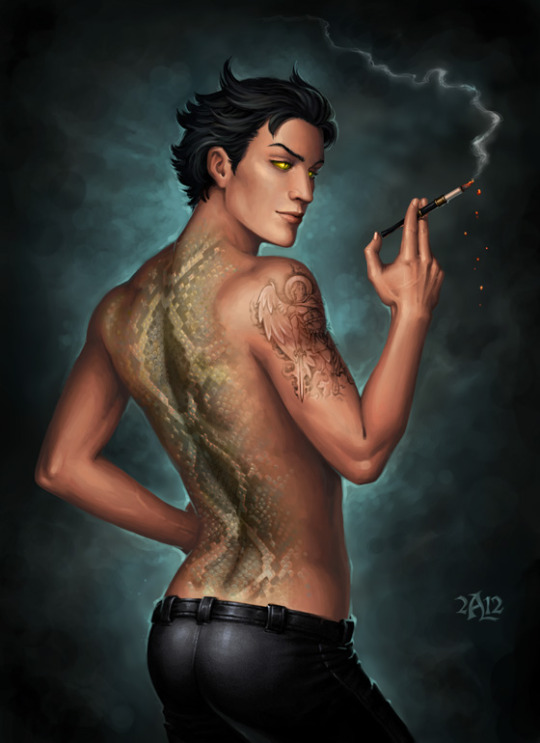
This artist’s tumblr is gone now but their art is still on dA and while it’s definitely beautiful and well-done, I think this is a very good example of what I’m talking about.
Crowley and Aziraphale necessarily contrast each other, so describing Aziraphale as “British” might suggest that Crowley is “foreign-looking.” I also know *ahem* that the fandom generally thirsts over Crowley to hell and back, so making him a swarthy, tall dark and handsome is not necessarily surprising.
An interesting thing happened when the TV show came out, and everyone started drawing Michael Sheen!Aziraphale and David Tennant!Crowley more and more often: It’s not ubiquitous, but it does happen that sometimes artists will draw David Tennant’s skin darker than it actually is. The subconscious urge to see Crowley with dark skin is for some reason that strong for many people. And I really encourage people doing this to think about why. Not naming any names but I’ve working with fanartists before for collabs who I had to ask to lighten “bad guy” demon’s skin tones because it looked like they were making the skin darker on purpose to make them look scarier. This person is a perfectly pleasant person who tries not to be racist! And we both still fell into it accidentally, and it took me a while to notice and point it out, because the ingrained stigmatization of darker skin is pervasive yet often goes unnoticed.
What is the solution? I don’t know, and as a white person I’m not really qualified to make that call. Do we draw them both with the exact same skin tone? Is it better to make them both white? Should we make both of them non-white? Should we only make Aziraphale non-white? I am consciously aware of the fact that the Good Omens fandom is mostly white people, so most of the art we make is being both made by and consumed by white people, so I don’t feel comfortable saying “draw these characters of color specifically” because that can also veer into fetishization territory very quickly. This is not specific to good omens but I think we should pay attention to what fans of color say in all fandom spaces and weigh our choices even if they seem insignificant. And it’s important to realize that fans of color will not be a monolith in their opinion either, and it’s our responsibility to recognize that everyone can be affected by racism and social issues differently, the same way all women are affected by misogyny differently so just because one woman says such as such is misogynistic and another says it’s not. I’m sure there are non-white fans who think it’s perfectly fine to draw Aziraphale as white and Crowley as ambiguously non-white. I’m not saying they’re wrong. And I’m not saying you can’t reblog this kind of art, or that people who make or made it should feel bad about themselves. But so often this sort of thing goes unaddressed just because people don’t like thinking about it, and well, avoiding hard questions never really goes well I think.
193 notes
·
View notes
Video
youtube
DIXIE CHICKS - GASLIGHTER
[7.67]
Well, we're ready to make nice...
Jessica Doyle: I made the mistake of reading some of the hell-hath-no-fury-like-Natalie-Maines-on-vocals early publicity, and ended up expecting something a lot less jaunty. If you played "Gaslighter" for a non-English speaker, I'm not sure they'd hear the angry breakup from the music and vocals alone. That stray "Look out you little--" heading into the chorus at 2:05 sounds downright affectionate. This makes for a less emotionally clean song, and the video feels like overcompensation (was the "Daisy" ad really necessary?). But it makes a certain sense. This isn't a fictional story à la "Before He Cheats"; the Chicks chose to eschew the luxury of marinating in two-dimensional righteousness. Adrian Pasdar, as much as he will now forever be known as That Guy Who Did Something on Natalie Maines's Boat, is also presumably tied up irrevocably with Maines's two sons and a couple decades' worth of her memories; she's allowed to refrain from hating him straightforwardly. "Gaslighter" is less cathartic than it could have been -- it might get bellowed into karaoke mics less often than it could have been -- but truer.
[6]
Katie Gill: Someone please just tell me what Adrian Pasdar did! I suspect that part of my love of this song is sheer nostalgia. I adore the Dixie Chicks and I'm so happy to see them make a comeback now, even if I worry that, with the current state of country music, it won't go anywhere. And I am here for the big divorce energy this single has. It's wonderful to see that the Dixie Chicks can summon up the beautiful cathartic anger that made their last album, Taking the Long Way, so good even over ten years later. And that anger is matched with gorgeous harmonies (that, granted, are a little bit too hidden by the arrangement), a cathartic chorus, and a brief moment of wonderful vulnerability from Maines near the end. Top that off with one of the best lyrics in 2020 in "you're sorry but where's my apology" and, look, I just can't wait for this dang album to come out already.
[8]
Alex Clifton: "Gaslighter, you broke me/You're sorry, but where's my apology?" has rung in my ears for nearly two weeks. I wrote a boatload of bad poetry for years around that sentiment, and the Dixie Chicks sing ten words what I couldn't do in a thousand, and I love them for it.
[10]
Wayne Weizhen Zhang: "You're sorry, but where's my apology?" So many lines in "Gaslighter" speak truth to my experience of being emotionally and psychologically manipulated, but every time I hear this one in particular, several things happen. First, my blood starts to boil and race and I feel my hands get clammy. Then, I instinctively clench my teeth and get the urge to pump my fists in the air. Finally, I remind myself that if the Dixie Chicks can get through the past decades, I can too -- and my anger dissipates like air from a balloon. That's the argument the Dixie Chicks are making here: winning the argument means not letting anyone else's actions consume your emotional state.
[7]
Tobi Tella: "Repeating all of the mistakes of your father" cuts like a knife, the harmonies are tight, and the lightness of the production makes it clear that they can still do fun. If there's any justice in this world, this would be a hit on country radio.
[7]
Michael Hong: "Gaslighter" is the Dixie Chicks' first single in fourteen years, and by virtue of being that, is interwoven with each thread its own narrative: 1) the story of the Dixie Chicks -- the rise, the fall, the good, the bad, all of it always culminating in the idea that the women had something to prove. 2) Jack Antonoff on writing and production, straying into bold country territory, furthering his influence in modern music. 3) The rampant use, and in some cases, overuse, of the term "gaslighting," and how it's already led to thinkpieces on whether or not Natalie Maines was actually gaslit. And finally, 4) the politicization of the Dixie Chicks, broadcasting the political as a mirror of the personal. All of these narratives matter, and yet, none are necessary to understand "Gaslighter." The track is compact in all the right ways, with tight harmonies on top of fiddle and banjo arrangements and verses that pick up right where the chorus lets off. The Dixie Chicks package the gleeful realization of the truth into a chorus so jovial you can't help but sing along. All that's to say, even divorced from every narrative that you can throw at "Gaslighter," "Gaslighter" still demands you turn the volume up when you hear it through your car stereo.
[7]
Alfred Soto: The inevitable emphasis on the dropped hook is purest Jack Antonoff, not Dixie Chicks, but the best of their tunes relied on outside help anyway. "Gaslighter" squeaks by on chutzpah, skill, and nostalgia from the silent minority of lib country listeners. But Antonoff's infatuation with percussion gives the Chicks the gaslighting urgency necessary to sell the songs in Labelle, Lynchburg, and Mena. They're still not ready to make nice -- except with Taylor Swift's producer's platinum cred.
[7]
Joshua Lu: Jack Antonoff is perhaps the last producer I'd expect or want to produce a Dixie Chicks comeback song, largely because his limited palette of plinky pianos and muted synths isn't something I'd think I'd like to hear in country music. To Jack's credit, though, "Gaslighter" is a veritable romp, even in spite of how unfulfilled some of the instruments are and how the chorus sounds like it's coming from a couple of rooms over. The real charm, though, is in the lyrics, so full of the charm and wit that really signify that this is a Dixie Chicks song -- "you know exactly what you did on my boat" alone makes the song a perfect addition to the sizable "My Partner Cheated on Me and Now I Must Destroy the World" section of the country music canon. Fourteen years might've been a long wait, but at least it was worth it.
[8]
Jackie Powell: So while 2020 has absolutely been an abysmal year, here's it's one redeeming quality: it set up an absolute glorious return for the Dixie Chicks. Their new single "Gaslighter" comes in at the right place at the right time. So do we have Taylor Swift to thank for this? Is it fair to assume that their vocals on "Soon You'll Get Better" (which might be the most beautiful song on Lover) were an introduction to Jack Antonoff? His signature drums on the second chorus and beyond provide the track with the train that will entice stans of Spacey Kacey Musgraves. A divorce anthem that is also reflexive to frustration with the world in 2020 is so on brand I want to cry. But tears of joy this time. The Dixie Chicks were some of the original victims of cancel culture. But really they were gaslit by their entire genre. Tomato-gate didn't happen until 2015, but the sexism the Dixie Chicks faced preceded the incident. What's fascinating about their return is they won't be in this fight with their genre and the country music establishment alone. Since the Dixie Chicks' hiatus, Musgraves, Maren Morris, The Highwomen and others have taken a spot on the no bullshit mantel next to the trio. It's refreshing. In classic Natalie Maines fashion, she regrets nothing, calling the repercussions of "Not Ready to Make Nice" a "blessing." But really, in 2020, we are the ones who are really truly blessed.
[8]
Jacob Sujin Kuppermann: "Gaslighter" is triumphant both in its specificity ("you know exactly what you did on my boat"!!!) and its broadness (the harmonies, Jack Antonoff's shiny-as-hell production.) Despite that glory, though, "Gaslighter" feels a little empty at its core. It's the rush of the breakup without the consideration of the fallout, the thrill without any crash.
[8]
Edward Okulicz: On first listen, this sounded too small, too restrained, too modest for its concept. These aren't things that you would expect from the big ambitions and big voices of the Dixie Chicks. But when the chorus comes in a second time with the drumbeat, it works as a mantra for a protagonist no more ready to forgive than she is to forget. And, as if you needed to be told, their voices still sound gorgeous together.
[8]
Oliver Maier: A tumbling boulder of rage for a chorus and Jack Antonoff graciously refraining from turning "Gaslighter" into a big echoey 80s-inflected synth pop confection. "We moved to California and we followed your dreams" is such a great opening line for the verse, charging the events of the song with a mythological, Dust Bowl-era resonance and signalling the relationship's disintegration before it even occurs, like something out of a Steinbeck novel. Maines rattles off each charge against her ex just vividly enough to get the raw emotional beats across, without fixating long enough to stall the song's momentum. A relationship is cremated and catharsis is achieved; no need for an autopsy when there's no ambiguity left.
[8]
[Read, comment and vote on The Singles Jukebox]
2 notes
·
View notes
Text
Let’s talk about Treks baby

The One Where Riker Stars In The Grey.
When Riker is reassigned to go over a terraforming colony bedeviled by pesky, genetically engineered wolves, a new first officer is assigned to the Enterprise. And he’s kwazy.
The irritatingly named Quintin Stone is sort of the Nick Locarno to Peter David’s later Mackenzie Calhoun. Brooding rogue, troubled past, gets the job done, you know how it goes. It’s a pretty unabashed power fantasy/Mary Sue in New Frontier, but there the whole thing is so over the top and tongue in cheek that you really can’t take it too seriously. Quintin, on the other hand, is more played for drama--for most of the story, there’s a question as to whether he’s outright homicidally insane. Luckily, Troi is on top of things, checking on his mental well-being and also kinda being his love interest, like a literal version of this gif.

Spoiler alert: It turns out he’s deeply traumatized by a not wholly believable incident in his past*, so good on ya for catching that one, Troi.
Looking back on it, this book would almost seem to count as a deconstruction of the ‘broody antihero’ trope, showing that the character type just doesn’t work in TNG. He infuriates most of the cast and doesn’t get the girl, while those who are taken in by him are presented as saps (yup, Wesley).
Speaking of New Frontier, with the self-aware jokeyness and tongue-in-cheek acknowledgment of Trek’s campier elements, would it be fair to say PAD was ahead of the curve in predicting the modern incarnation of Trek? Its take on Star Trek would definitely fit in with the Kelvinverse movies and especially with The Orville, which is pretty much the people’s choice for Trek these days.
*Okay, I get the interpretation of the Prime Directive as not interfering or revealing yourself to alien cultures until they develop warp drive, at which point they’re going to figure out you’re there anyway. And if you can stop an asteroid from wiping them out without them knowing about it, fine. Cool. I get that. But I don’t get Star Trek stories where the PD means you can’t interfere with the Romulans’ development, even though they’re showing up on your doorstep every other week and shooting at you. It’s like saying if Hitler 2.0 showed up in Germany and started amassing power, the US shouldn’t try to discourage that shit or, I guess, engage in any diplomacy whatsoever. It’s mindbogglingly isolationist. And isn’t it arguable that part of a culture’s natural development is interacting with other cultures? Like the back and forth between America and Japan driving forward the medium of animation?
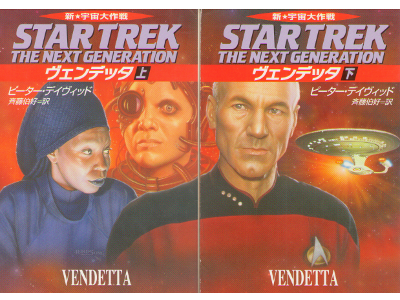
The One Where Picard Nearly Bangs Guinan’s Sister
This one has a bit of nontroversy attached to it, because it came out while Star Trek was still kind of hashing out the Borg, so there’s a disclaimer at the beginning basically going
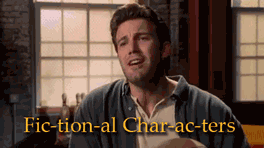
The gist of it is that Borg aren’t supposed to have gender (a bunch of people with blue hair just had their ears perk up, didn’t they?), but PAD here has a drone that gets detached from the Collective and is a girl. It seems pretty self-evident to me--Picard gets assimilated, they get him back, he’s still a dude, so why wouldn’t it work that way with a chick? But this is back when assimilation wasn’t the Borg’s m.o. the way it would later become. They assimilate a Ferengi in this book (yup) and it’s kind of a big deal. Oh, and as you might’ve guessed, Girl Borg bears a few similarities to Seven of Nine, who would show up later in the franchise, although PAD’s take on it is more “we rescued a girl from a serial killer’s basement after ten years and she’s totally catatonic,” less “what is this human emotion you call ‘kissing’?”
Good thing we have Deanna Troi, a counselor, to ease Girl Borg through the healing process. Oh, wait, she basically takes one look at GB and goes

Thanks for the help, Troi. I guess this subplot is supposed to prove that it’s pointless to try to save any assimilated person other than Picard, because mentally they’re already dead, so might as well just have a bunch of fun guiltlessly blowing them away
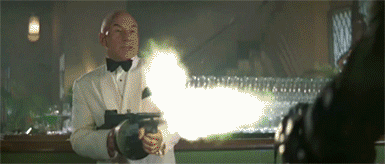
(And that goes for you too, audience.) But still, bit of a downer. At least Spock would’ve tried a mind-meld.
There’s also this chick Delcara, who in a pretty XXtra Flamin' Hot narrative choice is like Picard’s soulmate and he’s sort of in love with her slash obsessed with her after having a psychic vision of her in Starfleet Academy and y’know? TNG might’ve opened the door to this by having Crusher bang a ghost, but we should close that door. We should close it right now.
(By the way, in case you’re wondering if this Guinan’s sister business means Picard is down with the swirl, it turns out she’s Guinan’s adopted sister, so is it just me or is that weirdly ambiguous? She’s a beautiful black woman and Picard wants to do her. You can come out and say it, book. No one minds.)
Anyway, Delcara is piloting one of dem planet-killers from back in TOS--in hindsight, it’s weird that the Abrams movies never did anything with the one big Death Star-y thing that actually is canon to TOS, isn’t it? They gave Khan and Nero ridiculously super-sized ships, but the one kaiju that’s actually in continuity, nothing--on a vendetta against the Borg, who basically killed her family twice over. Man, if only there were some kind of psychologist on board the Enterprise to help her through that trauma.
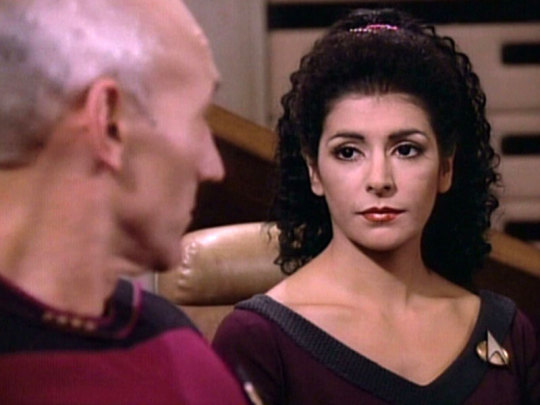
I sense she feels great bitterness, Captain.
Yeah, why does she get a seat next to the Captain again? Let Worf have that seat. How is it fair that he has to stand around all day, he actually does stuff!
Anyhoo, as you might’ve guessed from the opening set on a holographic rendition of Don Quixote, with a Data Discussion(tm) of quixotic endeavors... and the fact that Delcara intends to totally wipe out the Borg, gosh, I wonder if she’ll succeed--this one’s something of a downer. It does give the promised Planet Killer on Borg Cube action for those fanboys who’ve wondered who would win in a wrassling match, and Picard learns a valuable lesson about not pursuing suicidal vendettas against the Borg, which he definitely takes to heart...
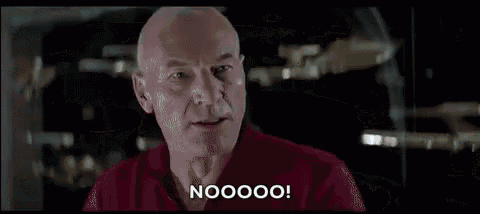
(Wow, he did that one-handed? What kind of gains does Sir Patrick have?)
But still... bit depressing.
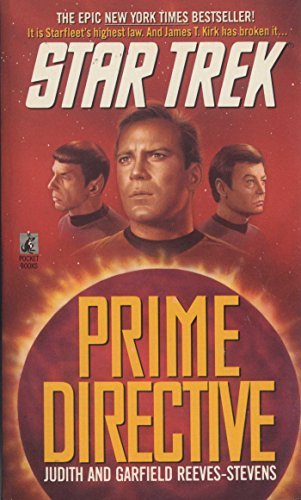
The One Where Bones Becomes A Space Pirate
Another giant novel, I’m surprised this one never got raided for parts in any adaptation. Even on the page, it’s pretty breathtakingly cinematic, and yet, the only part of it that’s really been used is, if you squint, Bob Burnham in Discovery being a disgraced Starfleeter.
The premise is that, some months ago, the TOS Enterprise crew was involved in a breaking of the Prime Directive that resulted in the destruction of a world and the ‘Enterprise 5′ of bridge officers blamed for the tragedy being shunned and hated wherever they go (ah, that utopian Star Trek future, predicting an entire population that’s politically engaged).
Now, with the command crew scattered, everyone’s trying to get back to the planet where it all happened to find out what tf went down for reals. In a bit of a stretch, this is really hard for them--no one seems to be able to call in a favor or hire Han Solo to take them there or anything, which I suppose is in keeping with Star Trek 3′s similar situation six years prior. They don’t have to go so far as to steal a Constitution-class this time. I suppose it’s fitting for the wild and woolly TOS era. In TNG time, they’d probably be able to dial a Space Uber. (As it turns out, it seems like if they’d just coordinated their plans, they all could’ve hitched a ride with Spock, but then there’d be no book, much less a Giant Book.)
Anyway, Kirk’s been court-martialed and is working as an asteroid miner, Chekov and Sulu fall in with Orion pirates, Spock is challenging the whole thing in court, and Uhura’s in jail........oh. It’s like that, huh, Starfleet?

Like I said, most of the plot involves the crew going off on all their separate adventures, eventually getting the band back together and figuring out what went down. Apparently, the book was criticized for its nonlinear structure, but I think it worked out really well. Starting months after the incident, with everyone disgraced, gets you pumped to find out what happened. Then when they flashback to the shit going down, there’s a great sense of foreboding because you know something is going to happen, just not what exactly.
If I can make a criticism, it’s that after some great build-up, the ending seems a bit anticlimactic. The nature of the threat requires some unbelievable Hollywood Evolution to buy (nothing new for Star Trek, admittedly, and this is a crew that’s fresh off meeting Apollo and Abraham Lincoln) and while it is fitting that they’re able to resolve the situation without blowing up anything or punching anyone (Star Trek loves to talk the talk about how anti-military it is, then end their movie with some Klingons getting blasted), it still seems a little... dry. You’re not going to have Kirk hang off of anything, story? Not even a little? Okay. I still had fun.
And you’ll note that once again, Deanna Troi was of no help whatsoever. Geez, woman, you’re oh for three here!
11 notes
·
View notes
Text
stop and un-remember this
Step away from the echo chambers of twitter and tumblr, and set aside the pockets of the internet where reviews live. Most of a show’s viewing audience -- hell, the vast majority of the US -- doesn’t reside in those places.
For the casual viewers who make up the silent majority of almost every viewing audience, there’s minimal interest in any convention circuit, or interview, or much of anything outside Netflix’s selections. (This is one reason for having reviews and interviews showing up in a half-dozen venues, to try and grab as many low-engagement viewers as possible.)
What that means is that, for the majority of viewers who are not as plugged-in as the core fandom, the story exists only as it’s shown on their screens. So let’s step back from JDS’ and LM’s ex-canonical explanations, and look at how the story appears when taken solely on its own merits.
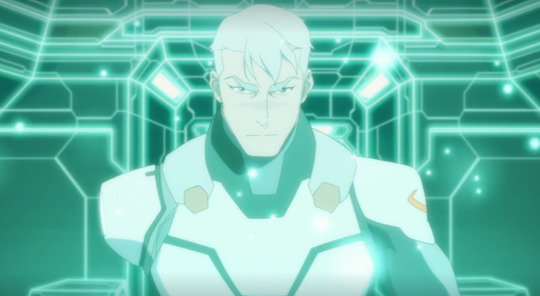
Behind the cut: five things the story doesn’t explain, and how the actual narrative might appear to a casual viewer.
1. Shiro has a degenerative disease; while perhaps not terminal, it does sound inevitably debilitating.
This is quite a bombshell, and it’s never mentioned again. Nothing in the story offsets or contradicts what Shiro -- or anyone else -- says in S7E1 about how much longer he’s got.
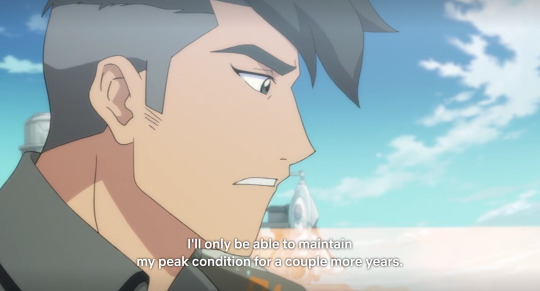
SHIRO: I’ll only be able to maintain my peak condition for a couple more years.
This is underscored by the series’ use of timeframes (to a greater degree than any previous season). We know Shiro spent a year as a prisoner, and from Pidge’s later comment about ‘four years’, we can deduce it’s been another year since then, plus a magical three-year timeskip in the return to Earth.
That means that for casual viewers, the season is shadowed by this assumption that Shiro has an expiration date -- and it’s not that far off in the future.
2. Keith inexplicably stops pressuring Shiro to take position as Black Paladin.
Nothing is said anywhere as to why Shiro is no longer tied to Black nor the Black Paladin. The closest we get to even a nod in that direction is when all but the five current paladins are frozen, in S7E6.
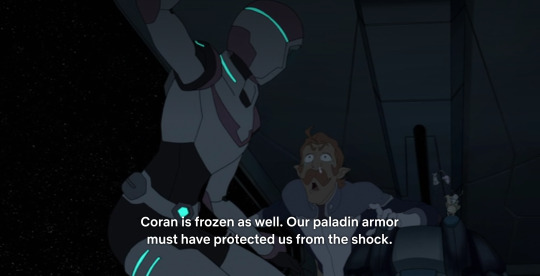
ALLURA: Coran is frozen as well. Our paladin armor must have protected us from the shock.
The problem is Shiro’s wearing armor, too, and he’s also frozen. That single line (and his exclusion from the bulk of that episode) seems to stand in for the message that Shiro is no longer a paladin.
At the same time, S7 had a complete absence of any protest from Keith. We’ve had 50+ episodes of Keith insisting -- even when all evidence pointed to Shiro’s death -- that Shiro remained the Black Paladin.
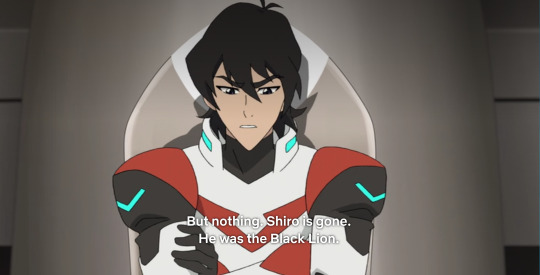
KEITH: Shiro is gone. He was the Black Lion.
A casual viewer might decide Keith’s silence in S7 meant Keith realized he’d been wrong all along. That in fact, the mantle of Black Paladin passed to Keith upon Shiro’s “death,” and the clone taking Black was another indication of the clone’s wrongness. That is, the clone stole Shiro’s memories and appearance, and Keith’s position as Black Paladin.
3. Shiro’s physical abilities are downgraded significantly.
Most of the fight scenes across S7, Shiro does little, if he’s even present at all. Krolia lampshades this by saying Shiro’s still recovering.
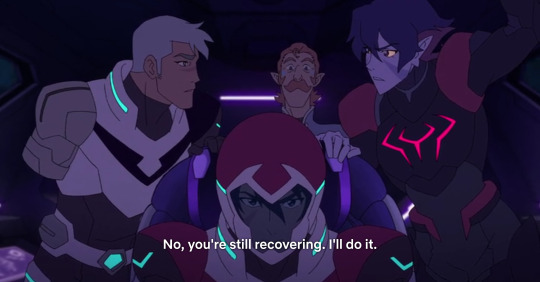
KROLIA: No, you’re still recovering. I’ll do it.
And in the last stretch of S7, Shiro’s contribution amounts to telling other people what to do; his previous physicality is reduced to acting as a conduit for Sam to hack his brain. And finally, Sendak defeats Shiro easily, compared to S1 where Shiro fought him to a draw.
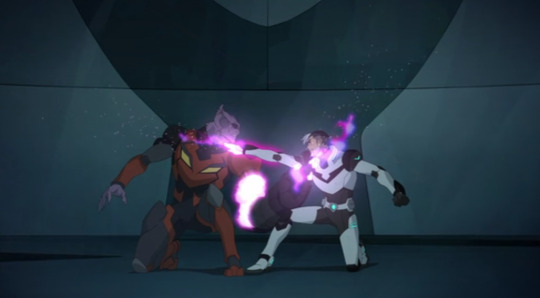
A casual viewer might thus assume Shiro himself chose (offscreen) to refuse Black’s position, between adjusting to a new body and the last stages of a genetic disease (since a clone with identical memories would reasonably also have identical physical aspects).
4. Shiro has the clone’s body, but not the clone’s memories.
In S7E1, the high-drama element is whether his awareness can fix itself to an unfamiliar body. Shiro calls out the clone-situation only once.
SHIRO: Well, I'm sorry, Lance, but I guess having my consciousness transplanted from the infinity of Voltron's inner quintessence into the dead body of an evil clone of myself has left me a little out of sorts for the past few weeks.
Later, Shiro mentions his “disappearance,” and says dealing with the long dark passage alone required adopting routines. He never references any events that happened during his absence. The narrative is pretty clear, so it’d be reasonable to conclude the two had completely separate experiences, and Shiro has none of the clone’s memories.
In short: Kuron was evil, is now dead, and has no further influence on events.
5. While we’re at it, a casual viewer might be unaware of the intended subtext of Shiro’s relationship with Adam.
Yes, yes, I’ve seen all the arguments that say it’s supposed to be coded as romantic, but it’s full of contradictions that create a certain ambiguity. For one, they’re in the officer’s club, with other people present. Second, although Adam asks what he means to Shiro, his next line could imply a long-term partnership of a military kind.
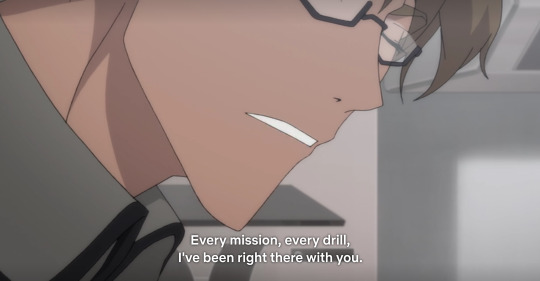
ADAM: Every mission, every drill, I’ve been right there with you.
Although the EPs/writers seem to put family together to a frightening degree that a modern military would never condone --- Matt and Sam on the mission to Kerberos, Veronica going with Lance to the battlefield --- that’s just not the assumption the average person is going to make.
In writing, you always put last what you want to stick in the reader’s mind. The order here leaves room for viewers to skip over any implications in the first line to linger on the second, which could be ambiguously platonic. A viewer not actively looking for queer representation could interpret this as Adam being afraid for his best friend, and possibly a bit jealous at being left behind.
At no point -- in that first episode, or later, when Shiro learns of Adam’s death -- does anyone speak of their relationship. Nowhere does Shiro even put a word to it. If casual viewers had already coded them as best friends or near-brothers, Shiro’s grief is still comprehensible and relatable. In some ways, the platonic aspect of other pop-culture bromances (ie Bucky Barnes and Steve Rogers) are just as strong, with mourning just as severe.
Honestly, there was more in a few lines’ exchange between Ezor and Zethrid to indicate a romantic relationship than there was in all of the Shiro/Adam interactions or references. “I’ll always take care of you” and “that’s my girl” are pretty unambiguous, especially given the character designs (and previous interactions) make it pretty clear these two are not siblings.
And --- unlike with Adam and Shiro --- they’re storyboarded with a certain intimacy. They’re alone, and Zethrid gets in close in Ezor’s personal space, with Ezor neither pushing her away nor recoiling.
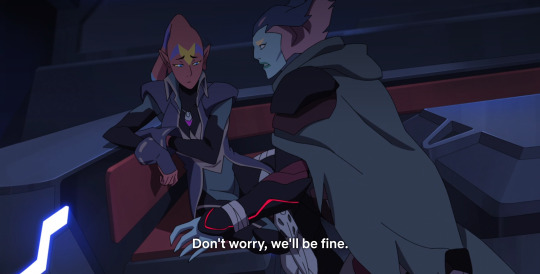
ZETHRID: Don’t worry, we’ll be fine.
If casual viewers had heard anything in passing about LGBT+ rep in VLD, it’s entirely possible they could’ve assumed this was the rep intended. Of course, both die in a fiery explosion not long after, but who’s counting.
in the absence of in-story explanation
It seems to me that a casual viewer --- lacking the EPs’ explanations --- might have found S7 somewhat confounding. Is Shiro now unable (or not allowed) to pilot Black because he occupies someone else’s body? Is Keith’s tacit appropriation of the Black Paladin mantle meant to signal the S4 handoff was a mistake? By virtue of his disease or his victimhood in Haggar’s schemes, is Shiro no longer qualified to be a paladin?
The season’s also full of characters framed as though we should care as deeply about them as we do about the core protagonists. Adam, Colleen, Iverson, Sam, and a dozen or more Garrison cadets and officers, all better trained, better disciplined, and better equipped than Voltron itself. They not only get two episodes of backstory (twice what Voltron itself got), they dominate most of the second half of the season.
Meanwhile, the protagonists struggle, needing Shiro to tell them what to do; they’re almost their own worst enemies more than Sendak is. Compared to the Earth forces who rally repeatedly, the Voltron team barely hangs in there. They need Shiro’s ultra-ugly oversized insta-mecha to intervene, before Voltron can get its act together long enough to strike the killing blow.
Honestly, it’s no surprise the first flush of audience reaction is so unhappy, if the majority were unaware of the EPs’ explanations. Almost all contradict point-blank what we see in the story itself:
Shiro’s disease was cured during his imprisonment or cured in the cloning process, but either way he’s fine, now
The clone was neither evil nor brainwashed, just basically Shiro doing his best until Haggar struck in late S6
Shiro and the clone are now merged consciousness, with Shiro retaining his memories plus that of the clone’s
Shiro’s link to Black has been permanently broken by Allura’s transfer; he’s no longer a paladin, full stop
Shiro and Adam were in a long-term relationship, either currently engaged or heading that direction, at the time of their breakup
None of that shows up in the narrative. None of it.
Lacking that ex-canonical information, it had to have felt as though the story’s expected trajectory was just thrown out the nearest window. Coupled with the extreme emphasis on an entirely new set of characters, I wouldn’t be surprised if casual viewers got the impression that S7 existed solely as setup for Voltron to gain a new and better set of paladins.
805 notes
·
View notes
Text
2018 fic writing roundup
tagged by @catty-words !! thank u darling
i have this lingering suspicion that the 92k mess that is imperfections has a tendency of bumping up my word count, but also i’ve been writing particularly A Lot this year. so. yikes. this’ll be a mess
Total 2018 Word Count: 465,233 (so uh. yikes squared?)
Total 2018 Hits: 16,798
Other 2018 AO3 Stats: Kudos: 1,592; Comment threads: 457; Bookmarks: 186; Subscriptions: 121.
Total 2017 Word Count: 171,640
Total 2017 Hits: 9,156
Other 2017 AO3 Stats: Kudos: 841; Comment threads: 172; Bookmarks: 126; Subscriptions: 40.
Links and Titles to 2018 Works (buckle up kids)
ten questions for new year’s eve (6,669 words) lonely s4 giles meets jenny on new year’s eve. basically fluff laced with some light angst, which i think set the tone for most of my writing this year
forever (4,738 words) some assorted femslash ficlets from tumblr that i immediately forgot about after february. it of course got buried under a deluge of jenny fic but there’s still some cute stuff there! i had a lot of fun in particular writing about bb willow and the beginnings of her attraction to girls
she’s your destiny (9,560 words) AHHHHHH I FORGOT I WROTE THIS. blessings of writing This Much. soulmate au with buffy/willow and giles/jenny where like. none of them are soulmates but they fall crazy in love anyway.
the happy-ending bouquet (3,851 words) set in 2018. giles and jenny have been married for something like 15 years and are still very happy and in love. basically just an endless deluge of fluff
personas (2,729 words) hhhhh i hesitate to count this as a 2018 fic, because i technically posted it in summer 2017 and then deleted it for reasons unknown (even to me). but there aren’t enough fics that explore jenny’s fractured sense of identity and her broken heart and i love my girl so much. so. wrote that.
something real (2,173 words) my valentine’s day fic!! a friend and i share the headcanon that jenny would have finally shoved her way back into giles’s heart if not for the love spell throwing her off, so. wrote a fic where that happened, albeit somewhat angstily.
direct, but not unwelcome (4,478 words) this fic always makes me cringe, a little; the office verse was written largely for faith and tara, and writing giles and jenny in it was a decision i don’t entirely like (mostly bc there really is no narrative place for either of them). but it has a few good lines ig?
putting a ring on it (2,370 words) giles and jenny proposal fic!! a little wobbly in places imo but still so fun to write. those two deserve all the fluff
the second choice soulmates (6,942 words) the inevitable faith/tara sequel to the soulmate au!! i had it planned from the second i started writing the first fic in that series, and i had a lot of fun with it. in which faith and tara have to deal with their soulmates being in love with each other, and end up falling in love themselves.
nightmares and the aftermath (1,205 words) the first fic i wrote in the ripper au! ripper has a nightmare; jenny talks him through it.
the inherent complexity of falling in love (3,519 words) more soulmate au nonsense!! this time with solely giles and jenny!!
let’s stay together (857 words) i say that this is “a series of vignettes in which ben, ann, and leslie are dating” but really it’s just one. i’ve kept it in bc i really wanna write more than one. ben/leslie/ann is such a blessed ship and there are no fics for it! which is ridiculous! because they really should all be dating!! leslie has two hands y’all
moments of connection in an uncertain world (3,351 words) the olivia/jenny fic that set that amazing ship on its course. set in asoue; jenny’s identity in the narrative is ambiguous bc jenny’s identity in every narrative is ambiguous. mystery bicon
amends (remixed) (2,988 words) i’m like 99 percent sure i spite-wrote this fic after watching amends bc that really seems like something i would do. in which ghost jenny makes sure buffy, angel, and giles all know that she doesn’t blame them for a single thing.
it’s a family affair (11 chapters) jenny, married to giles and mom to two daughters, loses her memory. i meant for this to be an exploration of jenny and giles’s relationship + jenny as a character, but with hindsight i feel like i kinda rushed it. maybe someday i’ll come back and expand this a little?
maybe i’m in love (24 chapters) CRIES. this fic was posted all in one day and got buried under the deluge of fic i wrote this year and i am still so sad that it remains forgotten. even by me. like i forgot it existed till now. but it is the treasure of my heart and i am still not sure what i can possibly do for calendiles day 2019 that will even come close to “slow burn giles/jenny series rewrite in script format.”
dragonslayers (8,048 words) i go back and forth between whether adding a sequel to a sappy-happy-ending fic was actually needed, but i had a lot of fun writing jenny and anya and tara being friends and adopting a dog. those girls deserve so much better.
tech support (1,315 words) jenny works at angel investigations, and giles meets her when he and buffy drive up to la to get a book. unabashed fluff.
family ties (2,294 words) giles introduces jenny to his dad and the aunts. i had giles call himself “rupert” for the entire fic and forgot to explain why i made the choice to do so (and there was a damn good reason!!!) so every time i see this fic....Regret™
i like you (992 words) the product of me realizing “wait, i never wrote a fic about my Very Specific Headcanon that giles and jenny had sex after school hard!!!” and then going ahead and writing that fic. not explicit; lots of giles and jenny being dumb and in love
take me now! (3,460 words) the sister fic to my other jenny/olivia fic! in this one, jenny’s a watcher and olivia’s the sweet librarian who has her all blushy.
the grieving process (9,771 words) this fic! was! such a trip to write! i wanted to write something where giles’s s6 issues were confronted. originally i wrote a jenny’s-alive fic where he goes to her place in la after leaving buffy in tabula rasa, but the mood of that fic was miserable and hostile, so i changed things ever so slightly. and then it became “giles goes to jenny after buffy dies,” and that transitioned into “giles actually finally gets to have an outlet for his emotions,” and then it became a very soft fic that i love very much.
unsolved mysteries (1,704 words) a modern jackaby au! where jenny cavanaugh has trauma-related anxiety and eats pretzels w jackaby in a hall closet! surprisingly soft.
the cleanup crew (2,968 words) post-ted; buffy calls jenny and giles in to help her with ted’s robot body. because that ep was a hot mess and too many things were tied up too fast.
princess charming (2,754 words) written thanks to a throwaway line from the grieving process! about jenny saving fred in pylea! @theforestlesbian mentioned in a review that this fic came off as “the adventures of jenny” and that was the best compliment ever.
untraditional, unconditional (4,223 words) ripper au! ripper and jenny get married! i don’t think i will ever write a better calendiles wedding than this one.
gettin’ bi (1,215 words) jenny and giles come out to each other. that’s really it.
intimacy (1,058 words) some root/shaw fluff. g o sh at some point i really should finish poi huh
the battle’s done (and we kind of won) (5,026 words) post-chosen; jenny inexplicably comes back from the dead, and giles works thru the messy aftermath of s7.
chaos, vengeance, love (1,412 words) giles’s exes talk over his grave. (and yes, i do mean jenny and ethan.)
buffy summers, muggle-born (6,075 words) buffy goes to hogwarts! this was meant to set the scene for a loosely connected string of fics, but i could never decide whether i wanted them to be chaptered fics or oneshots. i do have like 3 large chapters saved to my computer, tho :/
a eulogy (920 words) jenny calendar, as told by how she’s remembered.
survivors’ guilt (4,690 words) in which giles dies instead of jenny, and jenny and buffy deal with it poorly. my only problem w this fic is that i really wish i’d explored the messy aftermath of what might have happened if jenny had brought giles back. 2019 project y/y?
regarding honor and honesty in the workplace (43 chapters) CRIES IN JENNY/LILAH. given that i did not shut up about this fucking fic for a good 3 months, i don’t think it needs a summary.
maybe we could have a thing (3,184 words) giles and jenny’s first date!! canon told us they went out beforehand and it really did need to be ficced.
the most important words (2,753 words) passion fix-it! how many of these have i written dfshlsdhdf. anyway, by some lucky stroke, jenny doesn’t die, but she’s understandably kind of a mess. giles tries to help.
that brown-eyed technopagan (2,821 words) ripper au! willow has a HUGE crush on jenny calendar, who in this ‘verse is in her senior year at sunnydale high. lots of high school shenanigans.
seven new and very bad songs about jenny (8,597 words) another ripper au fic, this one about what it takes for ripper to finally give in and kiss the girl.
love of mine (282 words) one of the two fics i have written that involves giles grieving jenny. angst abounds.
the adjustment period (4024 words) i wanted to write about how weak vamp jenny is for her gf, so i returned to the grand romantic gestures ‘verse and explored that. femslash calendiles!!
love, scotch, and late-night parties (2,539 words) the aftermath of eyghon in the ripper au. jenny wants to be smothered in attention from ripper; ripper wants to give jenny the space he thinks she needs. basically the exact opposite of canon with the exact same inability to communicate.
father and son (3,761 words) in which ripper examines his relationship to his dad, and worries about treating his new son the same way. (spoiler alert: he obviously does not.)
imperfections (46 chapters) TECHNICALLY i added a few new chapters in 2018. i stg i’ll at least get closer to finishing it this year.
happily ever after (2,005 words) set after the dire king! jenny and jackaby being dumb and in love and experimenting with “the mechanics of ghost-human relations.”
cardboard robot (2,097 words) ripper au: halloween edition! ripper gets a pumpkin stuck on his head and sings about jenny, who Definitely Doesn’t Like Him What Are You Talking About Shut Up.
tea, with honey (3,295 words) a modern jackaby au, where jenny’s trauma really is trauma with no ghost metaphor. jackaby, darling of my heart, is still just as sympathetic.
very really married (6 chapters) THIS I WILL FINISH IN 2019. FOR REALS. i have too many unpublished chapters on my laptop to NOT finish it. set in s1; giles and jenny get drunk married in las vegas pre-canon. which, of course, adds a whole new level of complexity to both of giles’s new jobs.
coping (2,611 words) i really wanted to write about jenny and eyghon, bc there are like 0 fics that address the absolute mess that canon throws at that woman. so i did. very angsty with no clear happy ending, bc that’s what happens when you write canon compliant fic about jenny calendar.
yours (2,747 words) my first foray into writing phryne and jack! and, if the 4k-and-counting wip is anything to go by, definitely not my last. 2018 brought me a lot of things, but watching mfmm all the way through was definitely one of the best.
family ties (2,640 words) catch me crying about river and the ponds for the rest of my life, probably. centered around river’s graduation from luna university and her relationship with her parents.
decently clothed (1,516 words) lots of dumb calendiles fluff!! based on a paragraph from a btvs novel; jenny and giles go clothes shopping. it’s exactly as cute as it sounds.
making things right (1,060 words) passion fix-it that came to me when i thought “what if jenny survived, but didn’t even care that she’d almost died, bc what really mattered was that she’d fixed things with giles and buffy?? lmao how badly would that fuck giles up, knowing that she placed earning his trust over her own life???” and then i wrote it bc i love pain
bless her soul (6,294 words) s3. jenny comes back wrong. lots of explorations of the guilt that buffy, giles, and angel harbored for jenny’s death, with none of the pain of using jenny solely as a mouthpiece for evil. so like. amends done right.
dear friend (1 chapter, so far) a you’ve got mail calendiles au that i really do intend to work on some more in 2019.
haunted (15,622 words) WHAT a note to end 2018 on. a (mostly) non-supernatural au in which jenny, after an intense & awful trauma, leaves sunnydale and buys a ridiculously inexpensive mansion in england. why was it so cheap? because giles, the ghost who lives there, has been scaring off buyers. naturally, jenny is not easily rattled.
Favorite Fic: it’s hard to choose bc i wrote so many but for now i’ll pick bless her soul. writing the-first-as-jenny and playing up scooby guilt while still getting to bring jenny back for a happy ending??? that was just so much fun.
Hardest Fic: very really married. absolutely. i was in a v weird place while writing that fic, so that certainly didn’t help, but that fic has been giving me Trouble since i started writing it.
Do You Plan to Take Prompts in 2019? always!!
What was the best thing about 2018? friendsssss!!! i’m entering 2019 with a lot of solid friendships, which really wasn’t the case in 2018.
What was the worst thing about 2018? tbh the answer will always and forever be “my mom” until i am out of this house
Any last thoughts for 2018? how the FUCK did i WRITE more than half of the fics i have posted on ao3 in THIS YEAR ALONE. 55 FICS. i’m REELING.
Goals for 2019
finish the cheesy au g/j multichapters i started
maybe start work on a detective au sequel? i miss that ‘verse
more ripper au fic!!!!!
more jenny/olivia!!!
more jenny centric fic in general like It’s What She Deserves
SOMETHING about jenny and angel. i talk big talk about how much that dynamic fascinates me but i only ever touch on it in fic. it’s never the central focus.
finish the phryne/jack fic i’m working on, and maybe...tentatively...write more?
#fic#fic roundup#55 FICS WRITTEN i am. kinda in shock#i wanna tag people but i don't know who writes what so like#if u wanna do this consider urself tagged????
7 notes
·
View notes
Photo

Okay, lemme sum it up.
Kamen Rider is, in short, a superhero story. With all the spectacular super powers, wacky antics, high action, weepy melodrama, and existential navel gazing you’d expect from any Western superhero production. Despite its many iterations over the years, each Kamen Rider series is pretty much its own isolated entity with just about no canon crossover between one another. In Kamen Rider Decade, it was established that all the various Kamen Rider series are actually parallel dimensions to each other, so they generally don’t cross paths outside of non-canon specials, movies, or dimension-hopping hijinks.
There is no one single Kamen Rider. “Kamen Rider” is a title given to the series’ particular flavor of masked superhero. They’re all derived from the very first hero way back in the day - the definitive Kamen Rider Ichigo. He set the gold standard that every Rider since has cribbed. There are a few general themes surrounding Kamen Rider in general as a result.
More after the jump, because even summing it up can go pretty long.
Armor, not Spandex
Unlike Super Sentai (Power Rangers to us Westerners), Kamen Riders don’t wear stretchy primary-colored underoos. Less Spider-man, more Iron Man. They’re armored heroes, generally wearing motorcyclist’s leathers or something similar as underarmor. How fanciful or stylish the armor on top of it is varies from character to character. Kamen Riders always wear a helmet as part of their superhero persona. It’s generally a full helmet, with only one or two exceptions showing the lower half of the face in the far-flung past.
The reason for the motorcycle leathers and the helmet, aside from its iconic appearance, is because of the “rider” part of the name. Kamen Rider traditionally rides a motorcycle - back in the day the costume was designed around that theme, so it was meant to actually protect the stuntmen. It’s actually funny how much of the origins of the character were derived from necessity rather than design choices. What kind of motorcycle, and how fanciful its tech may be, varies from Rider to Rider. They’re generally light motorcycles or dirt bikes, though there have been some heavy Harley Davidson styles from time to time.
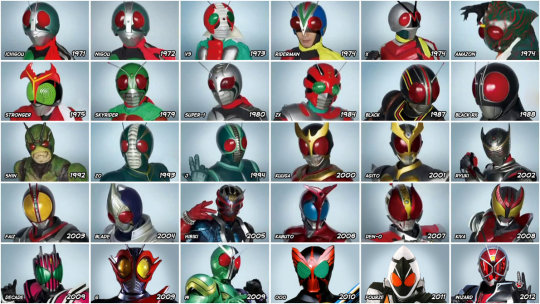
Henshin!
While how flowery or brief a transformation sequence is, or whatever other flavor is attached to it, all Kamen Riders will transform from their civilian form into their armored superhero persona via a Transformation Trinket (a belt, traditionally speaking). The iconic activation word is “Henshin!” (effectively meaning ”Transform!” in English). If you’ve seen any magical girl anime, you know what I’m talking about. While the transformation seems to be lengthy from the audience’s perspective, it’s actually pretty much instantaneous in-universe, even to the point of being a violent or destructive event from how sudden it is.
Further, a Rider will generally have power-ups available to them, either right from the get-go (though spread out for the sake of dramatic reveals) or through acquisition over time. Again, nothing new if you’re familiar with magical girl or shonen fighting shows. These power-ups come in many different flavors but generally fall under the categories of a new appearance/armor, new special abilities, new finishing attacks, new weapons, or upgrades to existing weapons and vehicles. It should be noted that while each hero will always have their own unique abilities/items/whatever, all Kamen Riders share the classic “Rider Kick”, which was the iconic finishing move of the very first Kamen Rider. It may not be a given Rider’s trademark finisher, but they’re bound to use it at least once in any given series (often as the final blow against the big bad) as homage to their roots.
youtube
Shared Origins and Motif
A common trait with Kamen Rider is that the hero and villains tend to share an origin. They often draw their power from the same source. For example, both the hero and villain may use alien technology (if not actually be aliens themselves), or magic, or some other medium to as the source of their powers. In ye olden days of yore, it wasn’t uncommon for Kamen Riders to be cyborgs. There’s even been a mutant or two. Whatever the source may be, the conflict arises in how the two differing groups choose to use their font of power - for good, or for evil. No matter how ambiguous their motivations may be, Kamen Rider are, at the heart of it all, defenders of justice and friends of the innocent.
As for motif - each incarnation of Kamen Rider has a theme it’s designs, enemies, and often overall plot are based around. For example, Kamen Rider Kabuto is themed on insects - thus the heroes’ armor and the villains are designed and named after insects. Kamen Rider Blade is based on playing cards, Hibiki is based on Japanese mythology, Kiva is based on classic horror monsters and stained glass, while Fourze is based on SPAAAAAAAAAAAACE! and astrology. Some themes are very blunt, such as Kamen Rider Wizard (a mage that uses magical gem rings) being based on jewelry and sorcerers. Others can be very outlandish to the point of seeming bizarre, such as Kamen Rider Gaim being based on a combination of samurai warfare, hip hop music, locks, and fruit. The villains will also generally follow the same or a very similar theme.
The Scooby Gang
How big of an ensemble cast any given Kamen Rider has around varies, but there are usually some staple characters to support them even if said Rider aims at solitude. It’s rare to see a lone Rider. Whether or not these family, friends, or companions know of the hero’s nature as a Rider varies, though there is generally at least one or two in the group who are aware. In cases where there is more than one Rider, the heroes (and eventually the villains) often know each others’ true identities sooner or later and hang out, even if it’s begrudgingly so. There is usually at least one character - often a civilian or other kind of non-combatant - who acts as the Rider’s true emotional anchor through the story. Generally a family member or some other close loved one. Sometimes it’s a romantic pairing, but that puts the likelihood of that character dying through the roof.
While there is usually (though not always) a main Rider and a supporting Rider, and sometimes many more Riders rounding out the cast, there’s never an established sense of hierarchy amid the Riders. Even if one is unquestionably more powerful than the others and takes the lead (as is invariably the case of the title character), they all tend to treat each other with equal measures of respect and companionship. There’s no pecking order to speak of and Riders are never seen as inferior or superior to each other. All Riders stand side by side in the name of justice. However, despite this sense of camaraderie, Kamen Riders generally don’t work as a cohesive team like Super Sentai do. They’re individuals cooperating with each other, not a unified group waving one flag.
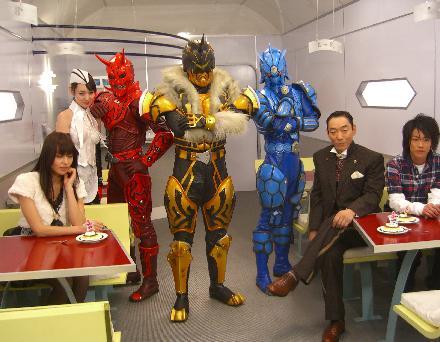
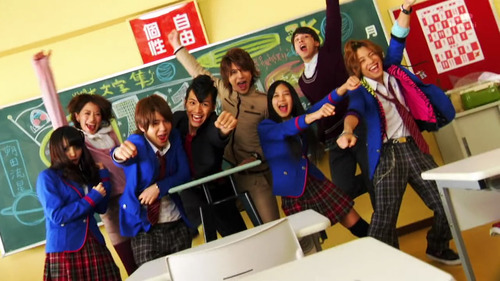
Oh yeah, People Die
And not just the villains. Kamen Rider has never shied away from doing away with its characters once and for all. Even if they might revive through some means during the show (either for drama or just a cop out), it’s safe to assume that not everybody is going to make it to the final curtain call. There are exceptions, but there’s more often than not a body count and lots of flashy explosions. Love interests, best friends, and mentors are the most likely targets. Depending on how much character development villains get, they can be an unexpected source of sadness when they bite the dust as well.
Part of this often comes from the fact that there will be an evil Kamen Rider or an anti-hero Kamen Rider at some point. Whether it be a traitor to the cause or the bad guys making use of the hero’s gear, things really heat up when there’s an equal force to match the hero’s power. It may also be a case of one of the hero’s previous friends turning against them for some reason, even if just as a misunderstanding or because of circumstances forcing their hand. These often result in the best fights and the biggest drama bombs in any given series.
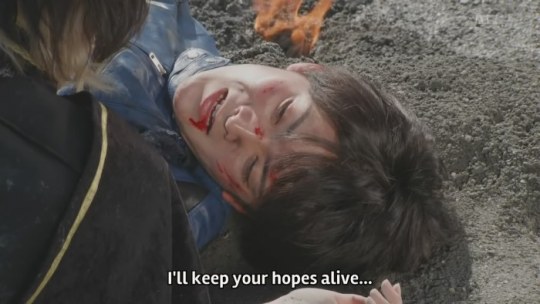
DRAAAAAAMAAAAAAAA!
One must always keep in mind that Kamen Rider is generally aimed at the youth demographic, ranging from late preteens to mid-teens. Adults get plenty of mileage out of the show as well (especially given modern incarnations casting popular/hot actors/actresses in leading roles). But no matter how fluffy the premise or how much comedy there is in the process, there will inevitably be a heavy drama bomb dropped around mid-way through. How big of a bomb it is, like so many other things thus far, varies from series to series. Generally speaking, it’s a soap opera twist more often than not. The hero may learn that the villain is actually a relative, or their sibling may be turned evil and forced into combat, or the hero realizes too late that they accidentally killed their best friend trying to protect the world. It’s all wrapped up with a bow by the end of the run, but it’s important to ramp up the dramatics for that big climactic finish.
On a similar note, there’s the matter of the stakes. Kamen Rider doesn’t do anything small - world domination and/or the destruction of humanity are usually the base line for villain goals. The baddies are always trying to get their hands on something and it’s up to the heroes to prevent it from coming to fruition. Usually via explosions.
Explosions
EXPLOSIONS. BECAUSE EXPLOSIONS.
youtube
32 notes
·
View notes
Note
What do you think makes a romance heteronormative? It's just sometimes I feel it's an important and valid criticism to make about heterosexual romantic relationships in media, but other times it feels like the word is misused and applied to any m/f ship someone happens to not like, and sometimes the line between the two seems to get really blurry for me. (especially as a queer woman)
It came to mind recently when being reminded how the RWBY fandom generally views Rosegarden as being heteronormative, and I'm never really sure... why that is, or why people see it that way, or what I'm maybe not seeing? Like, I don't agree with that assessment, and it's not gonna affect my personal enjoyment of the ship, but I'm so curious because I feel there must be a reason why people feel that way, you know?
Er, well, I am not sure I'm the best person to answer this, because I'm a straight cis woman. That automatically indicates I'll have some kind of blindspot.
That said, I'll take a stab at this, but again, take with a grain of salt, and I welcome discussion:
I think the "heteronormative" take is... all too often unclear, because what actually defines that term is precisely as you say: there is no precise definition. The goalposts get moved and moved to suit someone's interpretations, whether in good faith or bad. It's vague and subjective.
However, like you say, it doesn't mean there is no valid critique either. Because there absolutely is.
For me, I think heteronormative applies to het ships forced after years of queerbaiting.
For example, in The Rise of Skywalker, I think Poe/Zorri and arguably Finn/Jannah (though the latter was not explicitly romantic) were heteronormative in a bad way. Zorri and Jannah had no point in the story besides to straight-code Poe and Finn, who are a very popular shipped couple. Poe's actor, Oscar Isaac, even confirmed that he was playing romance for Poe, and the director commented on the importance of seeing gay rep in Star Wars (so he threw in a .1 second lesbian background kiss for unnamed characters that China didn't even censor so oh yeah, great rep, a real subversive hero). While Finn's character is much more ambiguous (he clearly showed romantic interest in Rey and had a fullfledged romance with Rose that got written out offscreen), the way both were forced into non-previously-set-up romantic dynamics in the last film of a trilogy was some very heteronormative bullshit right there.
Heteronomative isn't bad in the literal sense, but if it's forced? Then it's bad. Rosegarden is het because well, it's a guy and a girl (as far as we know, for now), but I will note that Ruby is the better fighter, yet is not just a "badass" but a complex character with compassion, and Oscar is sensitive and not at all embodying toxic masculinity. They challenge each other and have thematic symbolism linking them together. Whether or not it's shipped by people, it's not coming from nowhere, and there are ways in which it challenges cultural understandings of gender. It is het, but it does have potential to really work for the story.
When I evaluate ships in terms of canon possibility, I generally look at whether or not it's well-written or well set up, and/or what it would thematically offer the narrative. That's related to why I read stories and what I like to get out of them and others may engage with stories for different reasons, and that is completely fine; I'm not attempting to say my way is the best way. But for me, while rep is great, if it is not well written or is forced, it is not a more appealing ship to me. And I have privilege too, I can't deny that. It hurts not seeing good rep, and I can only imagine how it feels as a Wlw seeing the options out there.
Fandom is historically a place for those whose stories are not told very much in mainstream storytelling. There is SUCH a dearth of good WlW rep in particular that almost anyone who wants any rep has to make it themselves; hence, a close friendship becomes romantic in fanfic or fanart or headcanons, because the narrative won't deliver even if it isn't directly queerbaiting. Since we all bring our own assumptions, desires, and experiences to stories, people are drawn to such dynamics and want it to be romantic, and dismiss other ships as "heteronormative" even if they aren't badly written and may be more set up than the other ship. People are hurting.
Also, in general, there's a tendency in modern consumption of stories to treat stories as Catholic morality plays, and that spills over into shipping, where people morally justify why their ship needs to be canon or else the story will lead the children astray. Rep is morally good (it is), but what even is explicit rep is often debated in fandom (again, return to the idea that terms are vaguely defined). Like, people say Yuri on Ice was queerbaiting even though they exchange rings in a church and kiss, also share a bed, just because the arm was covering the mouth.
That said, there's still value to discussing the quality of rep. Like, rep is great, but you know what's even better? Good rep. Including characters who are only their sexualities runs the risk of tokenism. See again, the lesbians in TROS who aren't relevant in any way. Forcing ships even if queer wouldn't be good rep, either, though like... that doesn't really happen much because society. In an example of great rep, we have She-Ra, which is like... very prominent in its WLW rep in particular, but the rep ties into each character's arcs and the themes of the story (about queer love fixing a world broken by toxic masculinity and strict puritanism). The characters are affected by their sexualities to where you cannot remove it from their arcs and still fully appreciate the characters, but it also isn't the entirety of their characters. They do not exist just to be "lesbian" (looking at you Kennedy from Buffy, but at least Buffy's Tara/Willow was great). They are lesbians (and bisexual), and they are flawed humans, and their love saves their world. Yang and Blake, while not perfectly written, are also pretty good rep with set up that actually offers the best challenge for their arcs. (I think the teasing of Blake/Sun makes little sense especially when it's less thematically rich than Yang/Blake, so I'll forever be sour about this, sigh.)
Basically, we need more rep for everyone and everything. Treat the characters like characters, aka like people. They should not be forced by the hand of the author; they should feel like complex people even in their magical worlds, including in how they choose partners and if they do at all. For the sake of storytelling, if characters get together, it should offer something to the characters' arcs and the themes.
12 notes
·
View notes